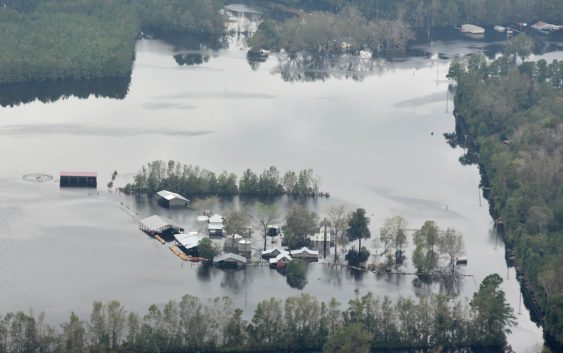- Couple accused of creating videos of young girls using hidden cameras at The Woodlands Mall, Hurricane Harbor
- Couple accused of creating videos with hidden cameras at The Woodlands Mall, Hurricane Harbor
- The Texanist: Texas Gets More Tornadoes Than Any Other State, but Don’t Freak Out
- U.S. Supreme Court says Texans can sue state for flood damage
- This is how many hurricanes NC State researchers predict this year
HURRICANE FLORENCE: Federal aid a 'first package'

Rouzer: Federal funds would allow state flexibility to respond to Florence damage
SOUTHEASTERN N.C. — A bill that would provide $1.6 billion in emergency federal funds for North Carolina in the wake of Hurricane Florence is just the first step in what will be a long-term federal response, said U.S. Rep. David Rouzer, R-N.C.
“This is the first package among more to come,” Rouzer said in a phone call from his Washington office after the House passed the bill.
The bill includes $1.14 billion in block grant money the state can use almost without restrictions, the congressman said. The remaining funds would be allocated to South Carolina, according to the bill.
Rouzer said work on the bill began even before the storm hit the region two weeks ago, including through declaring a state of emergency and obtaining a disaster declaration from the president as the storm approached.
“We started lining it up to get disaster aid across the finish line as fast as we could,” he said.
The money can be used for a host of rebuilding efforts, including for housing, infrastructure, businesses or schools.
During a visit to Pender County on Thursday, Gov. Roy Cooper identified housing — thousands of homes were damaged or destroyed by Hurricane Florence — as the top need.
“Housing is the most important long-term need we have,” the governor said. “I hope and believe this is a down payment on what will be billions of dollars in damage.”
The measure still must be passed by the U.S. Senate — passage was expected next week — and signed by President Donald Trump.
“This is only the beginning of our efforts to ensure North and South Carolina have federal resources to recover from the devastation caused by Florence and that hardworking families, small businesses, and farmers have the assistance they need to rebuild and get back on their feet,” U.S. Sen. Thom Tillis, R-N.C., said in a statement.
Rouzer said the storm also highlighted the need for continued federal funding of beach nourishment projects. During a meeting earlier this week, mayors of New Hanover County’s beach towns each said that previous projects provided enough sand to serve as a buffer against wind and storm surges, saving property along the coast.
“They proved that beach nourishment works,” Rouzer said. “It saved a lot of buildings along the coast.”
Rouzer said other lessons learned during Florence include the need to examine rebuilding in flood-prone areas and to enact some reforms of the Federal Emergency Management Agency (FEMA) to get aid into storm victims’ hands faster.
“In those places where flooding is a recurrent thing … we have to look at those places and ask what is the most appropriate thing to do,” he said.
Rouzer said he would also like to pursue other measures that may mitigate flooding, including elevating buildings in flood plains and cleaning river basins so water can flow to the ocean faster.
“When the water has someplace to go, you have less flooding,” he said. “One thing we’re going to ask is how do we mitigate damage from the next storm.”
Reporter Tim Buckland can be reached at 910-343-2217 or Tim.Buckland@StarNewsOnline.com.